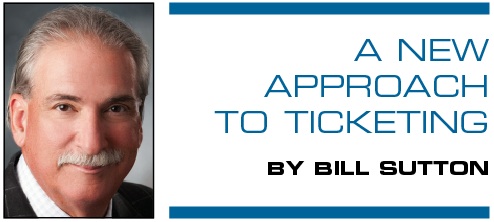Let me begin by stating that I am not opposed to what has been referred to up until now as the secondary ticket market. The so-called secondary ticket market has become primary because it met the needs of consumers in ways that the teams, at the time, were unable or unwilling to do. These sellers provide:
■ Access/availability: No matter what the event, there are always tickets available — for a price.
■
Affordability: The secondary market also has tickets for games where supply outstrips demand. Bargain hunters can elect to attend a game on a weeknight when there is usually much more available inventory and at a much lower price.
■ Customization: Secondary ticket market inventory permits the buyer to create a ticket plan that fits his/her budget, business/entertainment needs. Unlike ticket plans offered by the team, secondary ticket market buyers can determine the number of games they wish to attend, select a variety of seating locations, and elect to include premium amenities such as club access or food for some games but not for others.
■ Authenticity: The secondary ticket market historically lacked the perception that it was a safe and legitimate place to buy tickets. Ironically, the primary market, through sponsorship agreements such as the MLB/StubHub relationship, has granted that legitimacy and authenticity and even promotes it in ballparks.
■ Convenience: The potential buyer can shop numerous secondary ticket market sites and compare prices, utilize tools such as virtual views to compare seating locations, and even negotiate in the form of bidding for the tickets on various sites.
The combination of all of these factors has led to what some have described as the “death of season tickets” and a secondary market that buyers are turning to first when looking to purchase tickets. It has proved to be much more flexible and accommodating in terms of meeting their needs.
So what can the teams and other venues do to become “primary” once again? There are a variety of possibilities, but many of them might be perceived as more restrictive and the result might be to lose even more buyers to the secondary market. So I looked to my own experiences both as a season-ticket holder (with the Orlando Magic, Pittsburgh Pirates and University of Central Florida baseball) and as a Hilton time-share owner. What I envision is a program called FAME — Flexible Account Management and Execution.
Program elements
Just as a time-share owner has a base level of days to utilize during the course of the year, a season-ticket holder
 |
| Does the time-share market hold the key for a new approach to selling tickets? |
would purchase a season ticket in the price range he/she is most comfortable with and where they believe they will sit the majority of the time. In the hotel time-share concept, which has peak and off-peak utilization costs, the points are allocated against the times of year and the types of accommodations available. Supply and demand dictate costs. This is no different than the variable pricing models we have seen in professional sports (and this proposed concept also can be utilized to fit dynamic pricing models as well).
So if I have 7,200 points, that may translate to one-week prime-time in a one-bedroom unit or possibly two weeks in a non-prime-time studio unit. I could also elect to invest in a penthouse for four nights in New York City during the holidays. All of these options would exhaust my point allotment. But as you can see, I was able to move up or down depending upon my needs and interests.
In the FAME model, we would view the amount paid for the season tickets similarly to the flexible points in my Hilton example. Therefore, if I purchased season baseball tickets and spent $10,000, I would have access to the 81 games in the seat location that I purchased, or I would be able to use the $10,000 as points to be allocated for games that I would choose to upgrade or downgrade in consultation with my account representative, or a combination of the two. I can choose to attend whenever I want, except that if I do not choose to upgrade or downgrade, I am utilizing the tickets I bought whether or not I attend. So there is a “breakage” in terms of failing to manage my tickets. And in some cases, teams with available inventory might offer redemption nights to utilize tickets for games that have been missed.
The value of the games that I may choose to upgrade and utilize might come at a higher cost, possibly exhausting my account balance prior to the end of the season. This enables the team to sell me additional games or points, particularly if the team is involved in a pennant chase. Another value is that it permits buyers to vary their experiences by sitting in different locations with varying amenities. For example, a business owner holding club-level seats might wish to upgrade to entertain a client and would like to do that at the “Home Plate Club.” If inventory is available, then the transaction can take place and the buyer would work with their representatives to return to inventory the buyer’s original seats for that game and the appropriate number of seats/games to make up for the additional cost of the upgrade. This sampling program may result in that buyer purchasing a more expensive seat location the following year.
Another option might be to convert a number of games into a group night for employees, a church group or perhaps the son or daughter’s little league team. While this might be considered a downgrade, it is a fantastic sampling program for the team because it may bring in people who have never attended a game before.
It provides a higher level of control to the buyer than any other season-ticket product currently on the market, and that control is shared with the team, thus making the team the primary outlet. Another benefit for the team is that these tickets have been purchased at the season-ticket-holder rate, but when tickets are turned back in to the team for resale, they can be sold at the variable or dynamic rate, or even the day-of-game rate — in all cases probably higher than the original cost. This creates another profit center to be augmented by convenience fees for the exchange or the upgrade, but let’s not be excessive or once again we will drive them away.
Can it be executed?
I spoke with a number of teams who liked the concept, but I reached out to John Walker, president and CEO of Tickets.com, to find out what it would take to execute.
“The key to offering this type of flexibility to your subscription buyers is in the execution,” Walker said. “Traditional ticketing software has been designed with fairly rigid architecture that forces sales to occur in specific ways within the system so that sales activity can be audited and reported on very easily. This has limited the ability for organizations to experiment with alternative ways to price and sell their products. Attempts to configure ‘flex dollars’ packages in ticketing systems have been extremely cumbersome, and typically require a box office, call center or customer service agent to handle the transferring and fulfillment of event tickets from within the ‘flex’ package/account. Although this approach provides an opportunity for a team to offer a personal, concierge-like service for VIP customers, it doesn’t scale.”
Walker said that the goal at Tickets.com is to make technology more flexible and robust to allow experimentation in packaging, price and event allocation, while solidifying the reporting of data involved. He used the company’s ProVenue offering as an example. It allows the changing of any price for any particular ticket at any time, he said, unlike traditional systems that require the creation of a new ticket type every time a price is changed.
“This can be done with bulk and automated tools, eliminating the need for staff to manually update prices individually,” Walker said. “The key to the FAME-style offering is allowing fans to self-manage their account given the business rules established by the team for upgrades, exchanges, etc. We have already developed tools that enable fans to manage certain aspects of their tickets easily online, making it more convenient for fans to distribute and keep track of their tickets. The FAME concept would require additional development, but is certainly something that ProVenue’s flexibility will allow.”
I am hoping one of my clients or readers will agree to beta test the FAME concept in 2012. While it may not be the final solution, it is a start for the fans and the teams to work closer together buying and selling an entertainment solution that works for everyone.
Bill Sutton (wsutton@bus.ucf.edu) is a professor and associate director of the DeVos Sport Business Management Program at the University of Central Florida and principal of Bill Sutton & Associates. Follow him on Twitter @Sutton_Impact.





